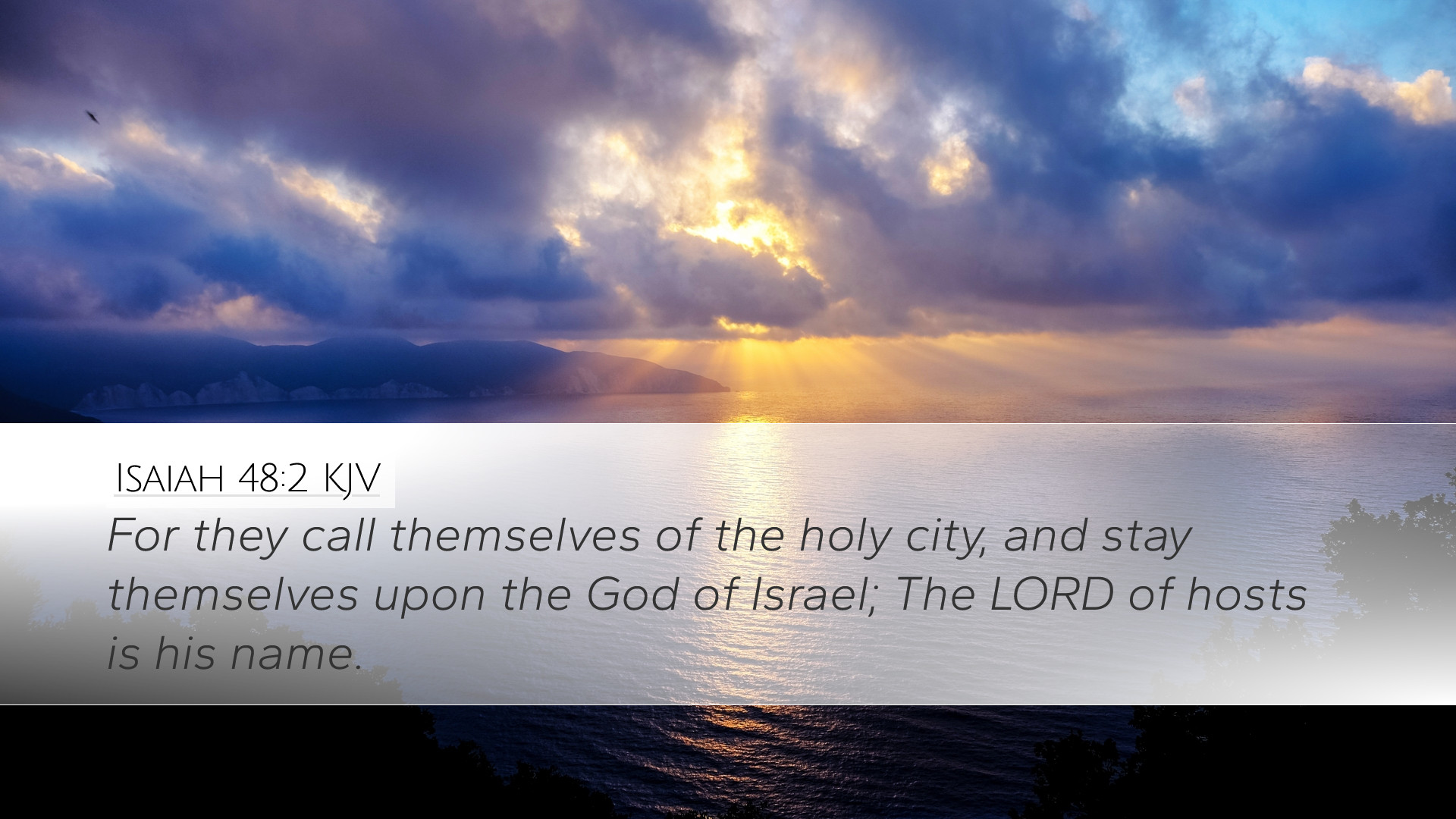Bible Commentary on Isaiah 48:2
Verse Text: “For they call themselves of the holy city, and stay themselves upon the God of Israel; The Lord of hosts is his name.” (Isaiah 48:2)
Introduction
Isaiah 48:2 represents a critical declaration regarding the identity and faith of God's people. This verse highlights the juxtaposition between the divine self-identification of Israel and the reality of their actions and faithfulness. The commentaries of Matthew Henry, Albert Barnes, and Adam Clarke provide profound insights into this text, revealing its theological, historical, and practical implications.
Contextual Background
Isaiah as a prophet delivers messages from God addressing the people of Israel, particularly during a time of turmoil and impending judgment. The historical setting of this prophecy emerges during the Babylonian exile, portraying both the challenges of Israel's faith and the assurance of God's ultimate control and deliverance.
Matthew Henry's Perspective
Matthew Henry illustrates the significance of claiming the name of the "holy city" and demonstrates God’s covenant relationship with Israel. He notes that referring to Jerusalem as the "holy city" accentuates not only its geographical status but its spiritual significance as a designated place for God’s presence.
-
Identity and Calling: Henry stresses that Israel's identity is rooted in their calling as God's chosen people, with Jerusalem symbolizing the divine covenant.
-
Reliance on God: The phrase "stay themselves upon the God of Israel" signifies an attempt to derive strength and support from God, which highlights their dependence on divine aid amid challenges.
Albert Barnes' Insights
Albert Barnes complements Henry's interpretation by focusing on the concept of Israel's relationship with God. He implies that calling themselves the “holy city” may fall short if it is not coupled with true faith and obedience.
-
Hypocrisy vs. Reality: Barnes emphasizes that there can be a disconnect between self-identification and genuine spiritual standing. Though they identify with the holy city, their actions often did not reflect faithfulness to God.
-
God’s Attribute: Barnes remarks upon the title “The Lord of hosts” which expresses God's sovereignty and power. It serves as a reminder to Israel that despite their failures, God remains omnipotent and active in their history.
Adam Clarke's Commentary
Adam Clarke offers a linguistic and cultural analysis regarding the terms and designations in this verse. He delves into the implications of the names used for God and how they inform our understanding of His character.
-
The Name of God: Clarke points out that the phrase “The God of Israel” underscores a deep-seated acknowledgment of the covenant that God established, linking them to His promises and faithfulness.
-
Exhortation to Authenticity: Clarke's commentary challenges the readers to cultivate a genuinely faithful identity that aligns with their declaration of being God’s people, rather than merely wearing the label.
Theological Reflections
This verse invites reflection on the broader implications of identity and reliance on God. It posits that true holiness is not merely a title one claims but is evidenced by faithful living and reliance on God's strength.
-
Holiness and Citizenship: As believers today, this verse challenges the modern church to examine what it means to be citizens of the Holy City, reflecting Christ in our lives.
-
God’s Sovereignty: The sovereignty of God as expressed in "The Lord of hosts" offers relevance for contemporary believers, encouraging trust and dependence in the face of adversity.
-
Call to Authentic Faith: Pastors and leaders are reminded that true identification as God’s people must be coupled with actions that reflect His character and commands, leading to authentic worship and service.
Conclusion
Isaiah 48:2 captures a moment of recognition and a call for introspection regarding the identity and actions of God’s people. The insights garnered from Henry, Barnes, and Clarke converge on the theme that holiness requires more than mere identification; it necessitates a true relationship with God, characterized by faith and obedience. The call to remain anchored in the promises of God should resonate deeply within the hearts of pastors, students, theologians, and scholars as they endeavor to embody the principles of faith in their lives and ministries.


